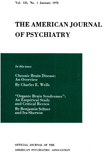Changes in Norepinephrine Turnover in Rat Brain During Chronic Administration of Imipramine and Protriptyline: A Possible Explanation for the Delay in Onset of Clinical Antidepressant Effects
Abstract
In this study the authors compare the effects of acute and chronic administration of the tricyclic antidepressants imipramine and protriptyline on the turnover and matabolism of norepinephrine in rat brain. The turnover of norepinephrine was decreased after acute administration but increased during chronic administration of these drugs. This increase in norepinephrine turnover occurred sooner when thyroxine was administered with the imipramine. This may help to explain why clinical antidepressant effects are generally observed only after chronic administration of imipramine or protriptyline and why thyroid hormone may accelerate and enhance the clinical antidepressant effects of imipramine.
Access content
To read the fulltext, please use one of the options below to sign in or purchase access.- Personal login
- Institutional Login
- Sign in via OpenAthens
- Register for access
-
Please login/register if you wish to pair your device and check access availability.
Not a subscriber?
PsychiatryOnline subscription options offer access to the DSM-5 library, books, journals, CME, and patient resources. This all-in-one virtual library provides psychiatrists and mental health professionals with key resources for diagnosis, treatment, research, and professional development.
Need more help? PsychiatryOnline Customer Service may be reached by emailing [email protected] or by calling 800-368-5777 (in the U.S.) or 703-907-7322 (outside the U.S.).



